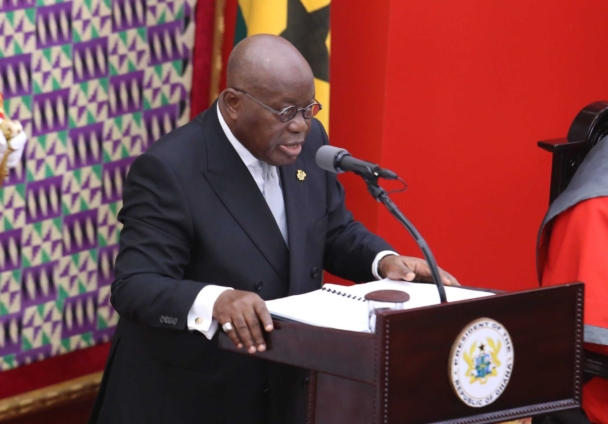adverts
President Nana Addo Dankwa Akufo-Addo has expressed profound regret over the unresolved conflict in Bawku, describing it as a source of personal distress during his final State of the Nation Address to Parliament.
Despite his administration’s achievements in resolving other long-standing disputes, the lingering conflict in the Upper East Region remains a significant challenge.
Reflecting on his tenure, the President highlighted the successful resolution of the Dagbon chieftaincy conflict as a defining moment of his presidency.
adverts
“The peaceful resolution of the Dagbon crisis stands as one of the highwater marks of my time in office,” he declared, emphasising the collaborative efforts that led to peace in the area after decades of strife.
However, the president admitted that the unresolved conflict in Bawku tempers the pride he takes in these accomplishments.
“It is a matter of great regret and distress to me personally that, in spite of our best efforts, the Bawku conflict remains unresolved,” he stated.
President Akufo-Addo acknowledged that chieftaincy disputes, including the one in Bawku, pose a growing threat to national security.
He warned that these disputes, if left unchecked, could escalate and destabilise other parts of the country.
“Bawku is, unhappily, not the only area of chieftaincy conflict,” he noted. “Chieftaincy has become a growing source of insecurity that requires sustained attention.”
In addressing these challenges, the President called for a renewed focus on equipping institutions like the Ministry of Chieftaincy and Religious Affairs and the National Peace Council. These bodies, he said, are critical to mediating disputes and fostering long-term peace.
“Strengthening the capacity of these institutions will be essential to addressing chieftaincy disputes effectively,” he stated, urging the incoming administration to prioritise this issue.
President Akufo-Addo reaffirmed his commitment to promoting peace and stability in Ghana, expressing optimism that continued efforts will eventually resolve the Bawku conflict.
He also appealed to all stakeholders to support peace-building initiatives and to prioritise dialogue over violence.


